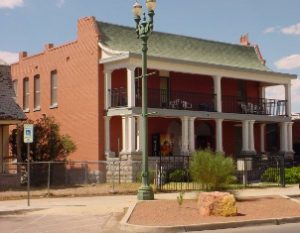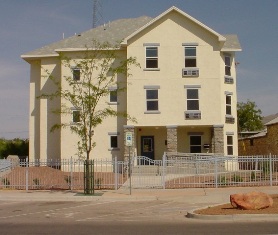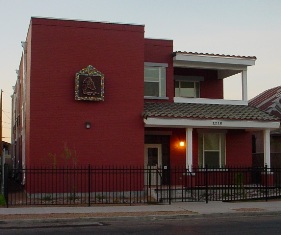OC Living Centers – Helping the homeless transition back into the community.
Safe Haven, 1307-1313 Magoffin St., El Paso, TX 79901 – This facility was created to provide safe, permanent housing for single men and women who are mentally disabled and chronically homeless. Residents are cared for and protected, connected with mental health counseling and psychiatric services, and encouraged to access all of the supportive services of the OC. Caseworkers assist the residents in complying with their medication so that they might become increasingly stable and support them in transitioning back into the community. A major component of the Safe Haven program is life skills training. Residents learn how to manage a budget, maintain their rooms and living spaces, cook meals, fill their medications, and other skills necessary for developing self-sufficiency. The goal of life skills training for our residents is to prepare them to reintegrate into the community, whether into subsidized housing programs, foster homes, or independent living spaces.
Missouri Street Residence, 526 W. Missouri, El Paso, TX 79901 – This residence, established in 1993, was the first permanent housing facility developed through a joint venture of the Opportunity Center and El Paso Coalition for the Homeless. It currently provides housing for 39 homeless single men who are transitioning from the emergency shelter towards self-sufficiency. Residents who stay here are all working, volunteering, participating in a training program, and/or going to school. Many are receiving treatment for a mental illness or have completed a recovery program to overcome a substance addiction. While living at Missouri Street, residents are encouraged to develop a self-sufficiency plan and pursue their work or education goals. These individuals are supported through one-on-one case management and life-skills training. They work together to clean and maintain the facility and commit to remaining drug and alcohol free as they take positive steps forward.
Magoffin Avenue SRO, 1221 Magoffin St., El Paso, TX 79901 –
The Magoffin Avenue SRO provides permanent supportive housing for 20 elderly, sick, or disabled men and women who are homeless. This residence will celebrate its 10 year anniversary in October 2012, and was created in response to a growing number of elderly homeless who had little hope of moving off the streets or out of shelters due to their fragile condition. All residents are between 55-90 years old, independent, and able to care for themselves. Those who are able to work participate in American Association of Retired Persons (AARP) job placement and training programs. Others attend adult day care programs where their health can be monitored while they participate in social activities, arts, crafts, exercise, and even field trips. Skilled home health aides regularly visit residents who qualify for home health services. In addition, all residents are able to access the supportive services provided by the Opportunity Center, including San Vicente medical clinic for mental health services, medical care, and medication needs. In the backyard of the facility, there is a small garden that residents can help tend and a walking path for those who want to get some fresh air and exercise. Caring staff are present to provide support to these elderly residents and ensure that their needs are met. While many have no families or loved ones who are able to care for them, it is here that they find safety and a loving environment.
Women’s Resource Center, 1220 Myrtle Ave., El Paso, TX 79901—
The Women’s Resource Center (WRC) is an emergency shelter for single homeless women. This is our newest facility, created in response to the growing number of homeless women in our community. Before this facility was created, homeless women were housed in a separate area within the men’s emergency shelter. It grew evident that this arrangement was problematic, and that the women could best be protected and supported in pursuing their goals given a separate facility. Now that the women have a safe place of their own, they have truly developed a supportive, community environment. The residents work together to maintain the shelter, advocate for each other, connect each other to resources, and encourage each other to make positive changes in their lives. Since the doors opened in October of 2008, it has become clear that a large portion of the homeless women population is comprised of women with mental illness and diverse mental health needs. The WRC has evolved to meet the needs of this population, assisting the women in complying with medication regimens, encouraging them to increase their independence by participating in life skills training, and supporting them in pursuit of their goals. Residents are connected with mental health counseling services and outpatient psychiatric care through Centro San Vicente clinic or El Paso MHMR. For women who are able to participate in work, training, or education programs, the WRC provides a safe, supportive environment in which they can take steps towards self-sufficiency. All residents receive three meals a day, clothing, and basic hygiene items. They are also connected with supportive case management services and have access to all the services the Opportunity Center has to offer.
Women’s SRO & Transitional Living Center, 1318 Myrtle Ave., El Paso, TX 79901 –
These sister programs provide transitional and permanent housing for single women who are transitioning out of homelessness and working towards self-sufficiency. Homeless women who are working on a self-sufficiency plan are encouraged to move from the emergency shelter into the Women’s Transitional Living Center, or Women’s TLC. This facility supports up to 16 women as they attend classes, volunteer, work, and/or participate in a training program. Residents work together to keep the facility clean and take turns preparing meals. They are able to stay at the Women’s TLC for a maximum of 2 years. To better assist residents as they pursue their goals, they are connected with all the services of the OC, provided with case management, and encouraged to participate in life skills training. Upon completing their time at the Women’s TLC, most women transition into their own apartments or are placed in our permanent housing facility, the Women’s SRO. This residence houses 12 women who are either working or going to school. For many of our homeless women clients, mental illness, substance abuse, and physical disability are major challenges to improving their situation. To assist these individuals, the Opportunity Center maintains a partnership with several other community agencies. Clients with mental health issues they are connected with mental health counselors and psychiatric outpatient care through Centro San Vicente clinic, located on-site at the Opportunity Center. Those working towards overcoming a substance addiction are connected with AA and NA meetings and referred to substance abuse treatment services through Aliviane Inc., also available on-site. In addition, some homeless clients are able to find work with employers like ReadyOne and the Department of Assistive and Rehabilitative Services (DARS), who provide employment opportunities for persons with disabilities or developmental delays.
Veterans Transitional Living Center, 818 Myrtle Ave., El Paso, TX 79901 –
The Veterans Transitional Living Center, or VTLC, is a program for homeless veterans that was created in 2001. The VTLC receives referrals from both the Opportunity Center and the Veterans Administration (VA). The goal of the program is to transition veterans from homelessness into permanent housing. Veterans are supported and encouraged as they are working, participating in training programs, and/or going to school. They participate in life skills training and are connected with supportive services through the VA, including medical and psychiatric care, mental health counseling, and substance abuse treatment. All the residents work together to maintain the facility and keep it clean. Residents of the VTLC can stay for up to 24 months. While in the program, they are provided with case management and supported as they work towards self-sufficiency. Once veterans complete the program, they are in a better position to move out into the community and continue to pursue their goals.






